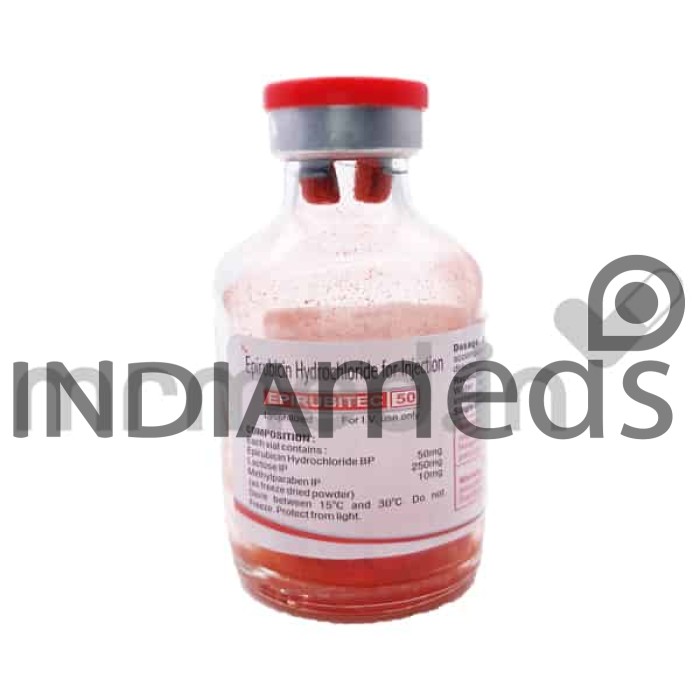Epirubitec 50mg injection contains the active substance Epirubicin Hydrochloride. It is an antineoplastic drug that belongs to the class anthracyclines. This medicine is used as adjuvant therapy in combination with other medications to treat breast cancer in patients who have had surgery to remove the tumor. It is also found useful in treating cancers of the breast, ovaries, stomach, bowel, and lung. In addition, this medicine is also used to treat cancers of the blood-forming tissues, such as malignant lymphomas, leukemias, and multiple myeloma.
Do not take this injection if you are allergic to epirubicin or any other ingredients of this medicine, pregnant or breastfeeding, or have severe liver and bladder problems. Before initiating the treatment, inform your physician if you have kidney or liver problems, recent vaccination, or if you have any acute toxicities such as acute inflammation of the mouth, low white blood cell count, platelet count, or any infections. This medicine may increase your risk of blood clots.
This medicine may cause infertility in men and women; inform your physician if you are planning for pregnancy. If you are sexually active, you are advised to use effective birth control to prevent pregnancy. Your doctor will do regular lab tests to check on the effects of this medicine. Common side effects of Epirubitec 50mg injection are decreased WBC, platelets, irregular menstruation, weakness, nausea or vomiting, diarrhea, eye infection, skin rashes, or itchiness.
Therapeutic Effects of Epirubitec 50mg Injection
Pregnancy
Epirubitec 50mg injection is unsafe to administer in pregnant women because it may cause severe birth defects. Inform your physician if you are pregnant, suspect pregnancy, or planning to become pregnant. Using an effective birth control method during the treatment and for 6.5 months after your last dose is necessary.
Breast Feeding
Breastfeeding is not recommended in patients taking Epirubitec 50mg injection because the medicine passes into the breast milk in small amounts and may harm your baby.
Lungs
It is unknown whether Epirubitec 50mg injection can be used in patients with lung disorders. Consult your doctor if you have any lung diseases before starting the treatment.
Liver
Epirubitec 50mg injection should be cautiously administered in patients with severe liver diseases. Dose adjustments are necessary. Inform your physician if you have liver problems before initiating the therapy.
Alcohol
It is unknown whether consuming alcohol will affect the effectiveness of Epirubitec 50mg injection. Consult your doctor for more advice.
Driving
Epirubitec 50mg injection does not affect the ability to drive or operate heavy machines. If you face any difficulties in driving, please consult your doctor.
Common
- Hair loss
- Flushing
- Rash, itching
- Diarrhea
- Nausea and vomiting
- Anemia
- Decreased WBC and platelets
- Eye infection
- Irregular menstruation
Serious
- Congestive heart failure
- Increased blood urea levels
- Severe hypersensitivity reaction
- Lung problems
Epirubitec 50mg injection is given as a cycle therapy. Your doctor will decide the dose and duration of the therapy based on your disease severity and condition.
There are alternative medicines that may work for you based on your disease condition and other factors. Your doctor will decide the alternative treatment tha works best for you.
This medicine may increase your risk of developing blood clots. If you have chest pain, trouble breathing, or pain, redness, or swelling in your arms or legs while using this medicine, call your doctor immediately. This medicine may turn your urine red for 1 or 2 days after your treatment.
There are no special restrictions on the diet. If your doctor or any other healthcare professional tells you to avoid certain food, then avoid it. Diet restrictions may vary from patient to patient. Consult your doctor for more advice.
Molecule name: Epirubicin | Therapeutic class: Antineoplastics |
Pharmacological class: Antimetabolite | Indications: 1. Breast cancer 2. Stomach and bowel cancer 3. Ovarian cancer 4. Lung cancer |







